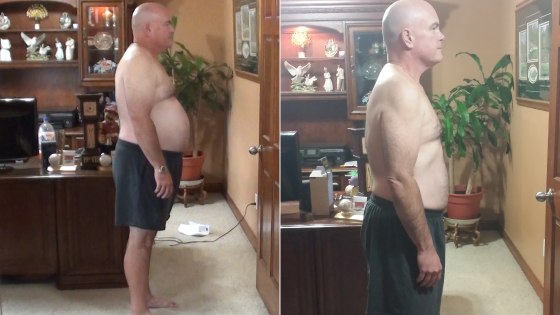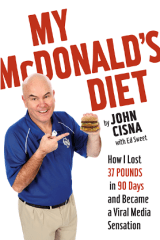
Courtesy John Cisna
When the experiment began on Sept. 15, John Cisna weighed 280 pounds, left. After six months of eating all of his meals at McDonald's, he says he's lost 56 pounds, 9 inches from his waist and more than 7 inches from his hips.
He makes nutritionists frown, but a man who ate all of his meals at McDonald’s for six months says he’s lighter and healthier as he nears the end of his unconventional weight-loss plan.
John Cisna, a high school science teacher in Colo, Iowa, who gained national attention for his experiment, says he has lost 56 pounds, lowered his cholesterol and lost a total of 21 inches off his chest, waist and hips while dining only at the fast food emporium.
As enthusiastic as Cisna is about the results, even he’s incredulous about what he’s done. He documents his experience, which ends on March 15, in the new book, ”My McDonald's Diet.”
“It’s kind of scary to realize that in nine days, I’ll have spent half a year of my life eating nothing but McDonald’s,” he told TODAY.
“I’m not bored of the food, but I am missing other foods. I am craving seafood. In fact, my first night when I am done with this, I’m going to have some shrimp and some scallops and some salmon. Maybe some asparagus on a bed of rice pilaf.”
As Cisna first told TODAY in January, he followed a 2,000 calorie diet, using the daily recommended allowances for carbohydrates, proteins, sugar and fat; and he walked 45 minutes a day.
Video: John Cisna, a 54-year-old science teacher from Iowa, says he lost almost 40 pounds eating nothing but food from McDonald’s for 90 days. Cisna stops by TODAY to talk about his journey and explain why he decided to embark on the diet.
When the experiment began on Sept. 15, the 6-foot-tall teacher weighed 280 pounds, amounting to a body mass index (BMI) of 38, which is considered obese. Now at 224 pounds, his BMI is down to 30 -- still obese but very close to the overweight category.
Cisna said he had no problems sticking to his diet – except one time when he was waiting for a flight at LaGuardia Airport after a long day and couldn’t find a McDonald’s.
“I was starving,” Cisna recalled. “In front of God and the whole world, I admit that that night, I had a bag of cashews, an apple and a diet Pepsi, so that’s the only time that I have broken from the diet.”
While enjoying his weight loss, Cisna is particularly excited about the results of his blood tests: He says his total cholesterol dropped from 249 to 190, including a 25 percent decrease in his LDL or “bad cholesterol.” Despite concerns that he was eating too much salt, Cisna said his sodium levels and blood pressure are normal.

Courtesy John Cisna
John Cisna's book about his experiment comes out Friday.
Still, experts aren’t impressed.
While applauding Cisna’s efforts to lose weight and improve his health, his McDonald’s diet is not realistic or reasonable for most people to follow long-term, said Elisa Zied, a registered dietitian nutritionist in New York and author of “Younger Next Week.”
Much of Cisna’s results have to do with cutting his calorie intake, so it’s not surprising that he lost weight and lowered his cholesterol, Zied said. But it’s likely his diet was high in sodium, low in fiber and not as rich in vitamins and minerals as it could be because it lacked a variety of fruits, vegetables, whole grains and other nutrient-rich foods, she added.
“I personally would not recommend this to anyone,” Zied said. “Fast food can be part of a healthful, balanced and nutrient-rich diet but it… shouldn’t be a large part.”
She advised people trying to lose weight to cook at home more, eat out less, and follow current Dietary Guidelines for Americans.
As for Cisna, he plans to stick to eating 2,000 calories a day – though not necessarily from McDonald’s.
“I’m not recommending anybody do the McDonald’s (diet), but it’s certainly is there for the taking if they want to try it,” he said. “There are many, many avenues – I’ve just opened up one avenue of a way for people to start to get healthy.”
Cisna said he’s not a paid spokesman for McDonald’s, though local franchises donated his food. He was largely inspired to do the experiment by Morgan Spurlock’s 2004 documentary, “Super Size Me,” which Cisna called “irresponsible journalism.”